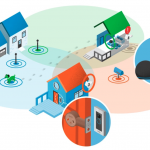October 27, 2021
Co-Director Urges for Better Transparency of Driver Data & Privacy
Newsweek

In an article with Newsweek, TPL Co-Director Ryan Calo participates in the current conversations surrounding driver data privacy. According to the article, cars have begun to collect immense amounts of data on their drivers. Unbeknownst to these drivers, their data is being sold to third parties like insurance companies to ‘tailor services to the average […]
MoreOctober 7, 2021
TPL Faculty Associate Franzi Roesner honored by NSF and Consumer Reports
Allen School News

TPL Faculty Associate Franzi Roesner was recently honored by NSF and Consumer Reports. Roesner earned a Consumer Reports Advocacy Digital Lab Fellowship to advance research into the spread of problematic online ad content to support more positive digital experiences for everyone. Together with Allen School colleague Amy Zhang, Roesner won an NSF Convergence Accelerator for […]
MoreSeptember 24, 2021
Co-Director and Faculty Associate awarded with 2021 Towards Trustworthy Products in AR, VR, and Smart Devices RFP
Facebook Research

TPL Co-Director Tadayoshi Kohno and Associate Faculty Franziska Roesner were winners of the 2021 Towards Trustworthy Products in AR, VR, and Smart Devices request for proposals launched by Facebook. The pair submitted a high-quality proposal related to secure multi-application augmented and virtual reality platforms.
ArticleSeptember 23, 2021
Tech Policy Lab Co-Director and Researcher Honored with Golden Goose Award for Work on Automotive Cybersecurity
UW News

Tech Policy Lab Co-Director Tadayoshi Kohno and Researcher Karl Koscher were honored with the Golden Goose Award for their work on automotive cybersecurity by the American Association for the Advancement of Science (AAAS).
ArticleAugust 5, 2021
Tech Policy Lab named by Forbes as a Leading Social Impact Platform Making a Difference with Digital Potential
Forbes

Forbes listed 20 leading social impact platforms making a difference with digital potential, in which the Tech Policy Lab was included.
ArticleJuly 13, 2021
Tech Policy Lab in the News
Various

During the 2020-2021 school year, the Tech Policy Lab was in the news with experts quoted in variety of articles on various subjects. Subject matter includes autonomous vehicles, data collection and surveillance, surprise charges, and liability tied to misinformation. Below are some highlights. Uber, Autonomous Vehicles, Criminal Liability September 17, 2020, Wired, Why Wasn’t Uber […]
MoreJune 28, 2021
Security robots show few tangible results
NBC News

“It would be difficult to introduce a single thing and it causes crime to go down,” said Ryan Calo, a law professor at the University of Washington, comparing the Knightscope robots to a “roving scarecrow.” June 27, 2021, NBC News, Security robots expand across U.S., with few tangible results
ArticleJune 26, 2021
Co-Director Tadayoshi Kohno Releases Novella “Our Reality”
UW Allen School News

In this Q & A, TPL Co-Director Tadayoshi Kohno discusses his new science fiction novella Our Reality. Our Reality is set in 2034 and is named for the fictional mixed-reality technology that allows one to go to class, meet up with friends, and get a workout in, all without leaving your bedroom. Kohno explains how […]
MoreJune 8, 2021
Surveillance and Privacy Concerns with Amazon’s new neighborhood wireless network “Sidewalk”
GeekWire

Amazon introduced Sidewalk, a neighborhood wireless network, to boost connection for devices within individual homes. Ryan Calo highlighted that it could possibly extend home surveillance techniques, increase costs, and decrease speed. Amazon has addressed some concerns by utilizing encryption and more user choice. Geekwire For further reading, please see: Amazon Indoor Ring Drone, Privacy October […]
MoreApril 30, 2021
TPL PhD Student Miranda Wei recognized by National Science Foundation
UW Allen School News

Miranda Wei, a second year Ph.D. student in the Paul G. Allen School of Computer Science & Engineering, was recognized with an honorable mention for her work with professor and TPL Co-Director Tadayoshi Kohno and professor and TPL Faculty Associate Franziska Roesner. Wei’s research focuses on usability of computer security and privacy (S&P).
Article